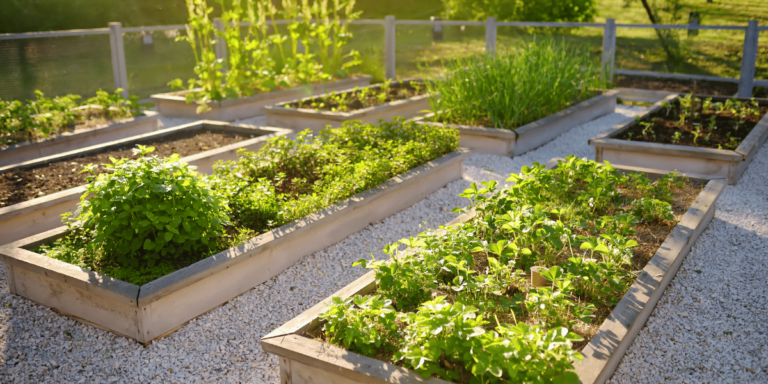Discover eco-friendly ways to keep your garden thriving with sustainable pest solutions that promote a healthy, balanced ecosystem. By implementing practices such as maintaining soil health, attracting beneficial insects, using natural pesticides, and adopting integrated pest management strategies, you can effectively control pests in your garden without harming the environment or compromising the health of your plants.
Key Takeaways:
- Implement eco-friendly practices to maintain a healthy garden and balanced ecosystem.
- Focus on maintaining soil health by using organic soil, compost, and mulch.
- Attract beneficial insects like ladybugs and lacewings to naturally control garden pests.
- Use natural pesticides such as neem oil and homemade sprays to avoid harmful chemicals.
- Adopt integrated pest management strategies for effective and sustainable pest control.
Maintaining Soil Health
To naturally protect your yard from plant-destroying bugs, it’s essential to keep your entire garden healthy. One of the most effective ways to achieve this is by maintaining soil health through the use of organic soil, compost, and mulch.
Organic soil forms the foundation of a thriving garden. It is enriched with nutrients and beneficial microorganisms that support the growth and resilience of your plants. By using organic soil, you create an environment that is less attractive to pests and more favorable to the health and vitality of your garden.
A key component of maintaining soil health is adding compost. Compost is a nutrient-rich organic matter that improves soil structure, enhances water drainage, and promotes the growth of beneficial soil organisms. It provides a steady supply of essential nutrients to your plants, making them more resistant to pests and diseases.
Another crucial element in maintaining soil health is the use of mulch. Mulching helps retain soil moisture, regulate temperature, and suppress the growth of weeds. Additionally, it acts as a physical barrier, deterring pests from accessing the plants. Organic mulches, such as wood chips or straw, also break down over time, enriching the soil with even more organic matter.
One type of mulch that deserves special mention is seaweed. Seaweed mulch and spray offer numerous benefits for your garden. They provide a rich source of nutrients, including trace minerals, that can boost the growth and health of your plants. Seaweed also acts as a deterrent to pests like slugs, which can cause significant damage to your garden.
By incorporating organic soil, compost, and mulch into your gardening practices, you create a strong foundation for a healthy and pest-resistant garden. These natural methods not only protect your plants but also contribute to the overall sustainability and well-being of your garden ecosystem.
The Benefits of Organic soil, compost, and mulch:
- Promote soil health and fertility
- Enhance nutrient availability
- Improve soil structure and water retention
- Suppress weed growth
- Discourage pest infestations
- Reduce the need for synthetic fertilizers and pesticides
| Organic Soil | Compost | Mulch |
|---|---|---|
| Enriched with nutrients and beneficial microorganisms | Improves soil structure and provides essential nutrients | Retains moisture, regulates temperature, and deters pests |
| Increases plant resilience to pests and diseases | Supplies a steady source of nutrients for plant growth | Acts as a physical barrier and prevents weed growth |
| Creates a supportive environment for beneficial soil organisms | Reduces the need for synthetic fertilizers | Breaks down over time, enriching the soil |
Attracting Beneficial Insects With Sustainable Pest Solutions

Beneficial insects play a crucial role in natural pest control. By planting nectar-rich flowers and avoiding pesticides that harm them, you can attract beneficial insects like ladybugs, lacewings, and predatory wasps that prey on garden pests.
Companion planting is another effective way to attract beneficial insects and enhance the overall health and yield of your garden. For example, planting marigolds can repel nematodes and aphids, while basil can discourage mosquitoes and flies.
By creating an inviting environment for these helpful insects, you can naturally maintain a balanced ecosystem in your garden, reducing the need for chemical pest control methods.
Using Natural Pesticides

When it comes to protecting your garden from pests, natural pesticides provide a safe and eco-friendly alternative to chemical options. Here are a few effective natural pesticides that you can use:
Neem Oil
Derived from the neem tree, neem oil is a powerful pesticide that disrupts the life cycle of pests without harming beneficial insects. It works by inhibiting the pest’s ability to molt, feed, and reproduce, effectively controlling their populations. Neem oil can be applied as a spray directly on the affected plants.
Homemade Insecticidal Sprays
You can easily make your own insecticidal sprays using common ingredients found in your kitchen. A mixture of garlic, chili, and mild dish soap can be an effective all-purpose spray to deter a range of garden pests. Simply blend these ingredients with water and spray directly onto the plants.
Essential Oils
Essential oils, such as peppermint, eucalyptus, and lavender, can be used to repel pests. These oils emit strong scents that pests find unpleasant, deterring them from infesting your plants. Dilute a few drops of essential oil in water and spray it on and around your plants.
It’s important to exercise caution when using any type of pesticide, even natural ones. Avoid spraying during windy conditions to prevent the spray from drifting onto unintended areas. Also, be mindful of the impact on beneficial insects and pets, and use these pesticides judiciously.
Comparing Natural Pesticides
| Pesticide | Target Pests | Application Method | Effect on Beneficial Insects |
|---|---|---|---|
| Neem Oil | Aphids, mites, caterpillars, beetles | Spray directly on plants | Generally safe for beneficial insects, but follow application instructions |
| Homemade Insecticidal Sprays | Various garden pests | Spray directly on plants | May harm beneficial insects if applied excessively |
| Essential Oils | Ants, mosquitoes, aphids, flies | Spray diluted mixture on and around plants | May repel or harm certain beneficial insects, use judiciously |
Using natural pesticides is not only beneficial for your garden but also for the environment. These alternatives help maintain a healthy balance in your garden by controlling pests while minimizing harm to beneficial insects and wildlife.
Integrated Pest Management Strategies
Integrated pest management (IPM) is a comprehensive approach that focuses on preventing and controlling pests using a combination of techniques, minimizing the need for chemicals. By employing various strategies, you can effectively manage pests while promoting a sustainable and environmentally friendly garden.
Pest Identification and Monitoring
Before implementing any control measures, it’s essential to identify the pests present in your garden. By understanding the specific pests and their lifecycle, you can develop targeted control strategies. Regular monitoring of your plants allows for early detection of pests, enabling prompt action to prevent widespread infestations.
Sanitation Practices
Sanitation plays a key role in pest management. Removing overripe or diseased produce helps eliminate pest food sources and breeding grounds. It’s also important to promptly remove and destroy infested plants to prevent the spread of pests.
Mechanical Control Methods
Mechanical control involves physically removing or deterring pests. Handpicking pests, erecting barriers, and using traps can be effective in reducing pest populations. For example, placing copper tape around plant containers can deter slugs and snails.
Cultural Practices
Cultural practices can create an environment that is less favorable for pests. Proper site selection, appropriate tillage techniques, and planting date optimization can help disrupt pest lifecycles and reduce pest pressure. Additionally, practicing crop rotation and intercropping can help prevent the buildup of specific pest populations.
Biological Controls
Biological controls rely on the use of beneficial organisms and natural substances to manage pests. Beneficial insects, such as ladybugs and lacewings, feed on garden pests, providing natural pest control. Biorational chemicals derived from natural sources, like insecticidal soaps and botanical extracts, offer effective pest management options without harming the environment.
Implementing integrated pest management strategies empowers you to address pest issues in a sustainable manner. By combining pest identification, monitoring, sanitation, mechanical control, cultural practices, and biological controls, you can maintain a healthy garden while minimizing the need for chemical interventions.
Crop Rotation and Plant Diversity
When it comes to maintaining a healthy garden and preventing pest infestations, two key practices to incorporate are crop rotation and maintaining plant diversity. These strategies can have a significant impact on the overall health and resilience of your garden, reducing the likelihood of pest problems and minimizing the need for chemical interventions.
Rotating crops involves changing what you grow in your garden each year, strategically moving plants to different areas or beds. This technique disrupts the life cycles of pests, making it more difficult for them to establish and thrive. Different plants attract different pests, so by rotating your crops, you create an environment that is less favorable for pests to settle and reproduce.
Maintaining plant diversity goes hand in hand with crop rotation. Planting a variety of species and cultivars in your garden encourages a healthy ecosystem that can naturally keep pest populations in check. By diversifying your garden, you create habitat for beneficial insects, birds, and other organisms that can serve as natural predators or help pollinate your plants.
Here are some benefits of incorporating crop rotation and plant diversity into your gardening practices:
- Reduces the risk of pest infestations
- Disrupts pest life cycles
- Encourages a healthy and balanced ecosystem
- Minimizes the need for chemical pesticides
By implementing these practices, you can create a thriving garden that is less prone to pest problems and more resilient to environmental challenges.
Example Crop Rotation Plan
| Year | Bed 1 | Bed 2 | Bed 3 |
|---|---|---|---|
| Year 1 | Cabbage | Tomatoes | Carrots |
| Year 2 | Tomatoes | Carrots | Cabbage |
| Year 3 | Carrots | Cabbage | Tomatoes |
In this example, we have three garden beds, and each year, the crops are rotated. By changing the crops’ placement, we disrupt pest life cycles and reduce the risk of certain pests becoming established. This rotation plan incorporates cabbage, tomatoes, and carrots, which have different pest attractant properties.
As seen in the image above, rotating crops and maintaining plant diversity can create a visually appealing and productive garden that promotes the health and well-being of your plants.
Benefits of Eco-Friendly Pest Control
Adopting eco-friendly pest control methods brings a multitude of benefits to your garden and the environment as a whole. By prioritizing the use of sustainable practices, you can create a safer and healthier garden environment while promoting biodiversity.
One of the key advantages of eco-friendly pest control is the creation of a safer environment that minimizes the use of harmful chemicals. Unlike conventional pesticides, which can have detrimental effects on beneficial insects, birds, and other organisms, eco-friendly alternatives offer a safer approach. These methods allow for effective pest management without compromising the overall health of your garden.
Promoting biodiversity is another significant benefit of eco-friendly pest control. By adopting practices that protect beneficial insects and other organisms, you contribute to the preservation of a balanced ecosystem. This biodiversity helps maintain a healthy garden environment, where pollinators thrive, natural predators keep pest populations in check, and a harmonious coexistence among various species is fostered.
Promoting Biodiversity in your Garden
Incorporating native plants and providing habitats for beneficial insects, such as ladybugs and lacewings, enhances biodiversity in your garden. These plants and insects play crucial roles in maintaining a balanced ecosystem, as they contribute to the pollination process and help control pest populations in a natural and sustainable manner.
Companion planting is another strategy that promotes biodiversity in your garden. By strategically pairing plants that have mutual benefits, you can create a symbiotic relationship that improves the health and productivity of your garden. For example, planting marigolds alongside vegetables can deter pests and attract beneficial insects, while growing herbs like basil can repel mosquitoes and flies.
Benefits of Eco-Friendly Pest Control
| Benefits | Description |
|---|---|
| 1. Safer Environment | Minimizes the use of harmful chemicals and protects beneficial organisms. |
| 2. Biodiversity | Preserves a balanced ecosystem by attracting and supporting beneficial insects and other organisms. |
| 3. Healthier Garden Environment | Creates an environment that promotes the well-being of plants, animals, and humans. |
Overall, embracing eco-friendly pest control methods not only safeguards the environment but also contributes to the long-term health and productivity of your garden. By prioritizing sustainable practices, you can enjoy a thriving garden while minimizing the impact on the surrounding ecosystem.
Conclusion
By implementing sustainable pest solutions and embracing eco-friendly gardening practices, you can create a healthy and thriving garden while minimizing harm to the environment. From maintaining soil health to attracting beneficial insects, using natural pesticides, and adopting integrated pest management strategies, there are numerous ways to control pests without compromising the well-being of your garden.
Ensuring the health of your soil by adding organic matter such as compost and mulch provides a solid foundation for your plants and helps naturally deter pests. Attracting beneficial insects like ladybugs and lacewings can be achieved by planting nectar-rich flowers and avoiding harmful pesticides. Utilizing natural pesticides, such as neem oil and homemade insecticidal sprays, offers a safe and effective way to combat pesky garden pests without harming beneficial insects or the environment.
Integrated pest management strategies, including pest identification, regular monitoring, sanitation practices, mechanical controls, cultural practices, and biological controls, offer a comprehensive and sustainable approach to pest control. Additionally, rotating crops and maintaining plant diversity can disrupt pest life cycles and create a balanced ecosystem that naturally keeps pest populations in check.
By adopting eco-friendly pest control methods, you not only create a safer environment by minimizing the use of harmful chemicals, but you also promote biodiversity and contribute to a healthier garden environment. Embracing these sustainable practices allows you to enjoy the beauty and abundance of a healthy garden while fostering a more sustainable and environmentally friendly approach to gardening.
FAQ
What are sustainable pest solutions?
Sustainable pest solutions are eco-friendly ways to control pests in your garden without harming the environment or compromising the health of your plants. They involve practices such as maintaining soil health, attracting beneficial insects, using natural pesticides, and adopting integrated pest management strategies.
How can I maintain soil health in my garden?
To maintain soil health, you can add compost and mulch to your organic soil. This helps keep the foundation of your plants healthy. You can also use seaweed mulch and spray to add essential nutrients to your foliage and keep pests like slugs away.
How can I attract beneficial insects to my garden?
To attract beneficial insects like ladybugs, lacewings, and predatory wasps, you can plant nectar-rich flowers and avoid using pesticides that harm them. Companion planting, such as planting marigolds to repel nematodes and aphids or basil to discourage mosquitoes and flies, can also attract beneficial insects and enhance the overall health and yield of your garden.
What are some natural pesticides I can use?
Some natural pesticides you can use include neem oil, which is derived from the neem tree and disrupts the life cycle of pests without harming beneficial insects. You can also make homemade insecticidal sprays using common ingredients like garlic, chili, and mild dish soap. Essential oils like peppermint, eucalyptus, and lavender can be used to deter pests, but be cautious to avoid harm to beneficial insects or pets.
What is integrated pest management (IPM)?
Integrated pest management (IPM) is a comprehensive approach to pest control that emphasizes prevention and the use of multiple tools to minimize the use of chemicals. It involves pest identification, regular monitoring, sanitation practices, mechanical control methods, cultural practices, and biological controls to manage pests in a sustainable manner.
How can crop rotation and plant diversity help prevent pest infestations?
Crop rotation and plant diversity can prevent pest infestations by disrupting pest life cycles. Different plants attract different pests, so changing what you grow each year can help keep pest populations in check. Plant diversity also encourages a healthy ecosystem that can naturally control pest populations, reducing the need for chemical interventions.
What are the benefits of eco-friendly pest control?
Eco-friendly pest control practices create a safer environment by minimizing the use of harmful chemicals. They also promote biodiversity by protecting beneficial insects and other organisms in your garden. Overall, eco-friendly pest control contributes to a healthier garden environment with a balanced ecosystem that supports the well-being of both plants and animals.
How can I create a healthy and sustainable garden?
To create a healthy and sustainable garden, you can implement sustainable pest solutions such as maintaining soil health, attracting beneficial insects, using natural pesticides, adopting integrated pest management strategies, practicing crop rotation and maintaining plant diversity. These practices will help control pests and promote the well-being of your garden in an eco-friendly way.
Where can I find more information about eco-friendly gardening practices?
For more information about eco-friendly gardening practices, you can refer to reputable gardening websites, books on organic gardening, or consult with local garden centers and experts in your area who specialize in sustainable gardening.










